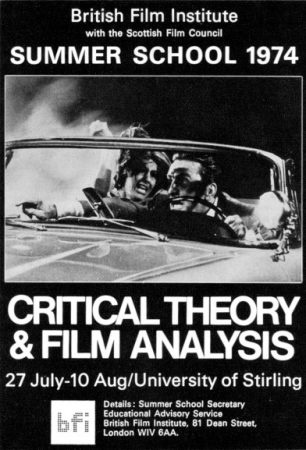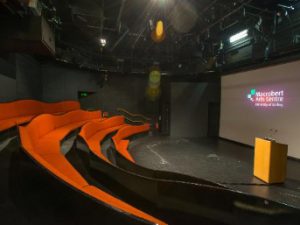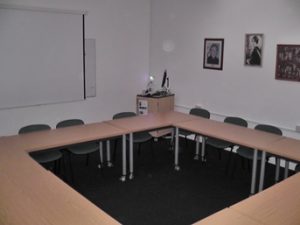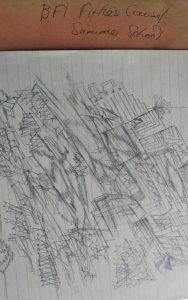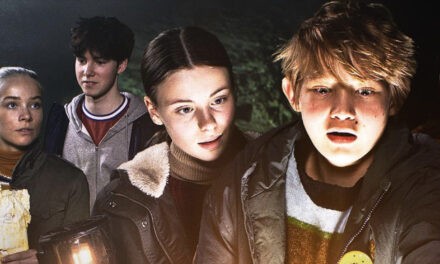After a quiet 2019, I had a slew of conferences lined up for 2020. Little did I know what was going to happen as I left the first of them in January, an enjoyable MeCCSA conference in Brighton. And then it began – in quick succession plans for a workshop in Lund and conferences in Glasgow and Dijon fell apart along with a number of the public seminars and events that normally offer me, as a retired academic, a sociable and interesting way of keeping up with what others are thinking.
At first the conferences were just cancelled. Then there were suggestions that they might go online and indeed I did follow some Royal Television Society events and a couple of US television seminars on zoom and youtube. And then it became clear that conferences were being planned for going online, such as the highly ambitious Clara conference, and that real thought was going into how proposed virtual conferences might break with the conventions of the past conferences. The SCMS Board, announcing that its 2021 conference will be a virtual one, said that ‘we plan to use this unusual circumstance to be nimble, inventive, and to collectively reimagine the conference in exciting and heretofore impossible ways’ while, more concretely, the flyer for the conference organised by the International Gothic Association described a plan whereby presentations could be read in advance by participants so that panels could be largely devoted to discussion.[1]
The possibility begins to emerge that this is going to be the new normal. Moreover, an article in Times Higher Education magazine suggested that this might be a good thing and that virtual conferences would be, as the headline put it, ‘a great equaliser’ (9 July 2020, p. 8). A virtual forum on the future of academic conferences had heard that ‘Digital discussion can allow shy researchers to be better heard, and leave no room for sexual harassment during social interludes’. The article quoted Katye Altieri, an oceanographer at Cape Town University, as saying that virtual conferences gave researchers from Africa and elsewhere better access and denying that the human connection of face-to-face events would be much missed. ‘I have met very few people of colour [or] young women who miss the socialising . . .For the most part, that is a difficult and sometimes even negative situation for young people and women in particular’. And of course there is the claim more generally made that digital access is more environmentally sustainable.[2]
Clearly, there will be more debates and more decision-making about virtual conferences and meetings. My purpose here is to register how these months without conferences and workshops have set me thinking back to the way I had explored and learnt about film and media studies in the past. I realised how much of my education was shaped and expressed by the physical context in which it took place. In the 70s and 80s, after graduating with a Literature/History degree, I worked as a clerical officer and administrator. In my spare time, I attended British Film Institute evening classes and summer schools lasting a week or more; weekend and day schools organised by the Society for Education in Film and Television; and two small reading/viewing groups. Most of the people attending knew more than me (many were already trying to teach film in secondary schools or polytechnics) but everyone was battling to get at new knowledge and no one had a degree in film or media studies.[3] Looking back, the memory of the topics and debates, the viewing and the reading, is inextricably bound to memories of particular places and spaces and the people who crammed into them.
SEFT weekend schools were often held in extremely cramped rooms at the London Film School in Covent Garden, London. It was there, I think, that I heard Raymond Williams talk in measured, mellifluous tones about Realism, a voice which I remembered when I sometimes later struggled with reading his work. Williams’ physical presence was striking; he apologised for sitting down to deliver his lecture but his voice quietly held a packed room, arranged on three sides around him. That sense of a lecture as a performance in a shared space, not the recital of a paper we would have been better off reading, stuck with me. Since then I have enjoyed many a plenary where the speakers recognised that difference.
I remember also the awed respect with which Williams was treated by some of the big beasts of SEFT, a respect that was not always accorded others. At another SEFT school, I seem to remember a whole session was devoted to three white male contributors (Paul Willeman, Colin MacCabe, Stephen Heath, perhaps?) talking to each other literally above the heads and bodies of those in the crowded audience, some of whom were sitting on the floor. When protest at this was expressed afterwards, we were told we had been listening to an “exemplary conversation” (my memory). Certainly this gave physical expression to the belief held by some in SEFT that there was a difference between ‘”cutting edge theoretical work on the one hand and transmission belt work on the other”’. (Willeman to Bolas, p.281)
An aspiration to a different kind of learning was expressed in the organisation of the BFI summer schools. There were big plenary events – I remember the curved cinema auditorium at Stirling University full of students and staff clutching a stencilled copy of Christian Metz’s ‘Grand Syntagmatique’ and trying, as a huge group, to apply its terms to chosen extracts (see Fig. 3). But generally we were broken into seminar groups in smaller rooms in which we sat in a square, facing each other, with books, papers and cans of Irn-bru on the tables in front.[4] (see Fig. 4) Two tutors sat with us in the group and the discussions were sometimes lively, sometimes puzzled, sometimes despairing but nearly always fruitful. My essay in the National Fictions dossier, which arose out of the 1983 Summer School, was more or less written in that seminar room and much of my later teaching on British cinema and television was inspired by the BFI summer schools. (see Fig. 5).

Fig. 5: National Fictions book cover.

Fig.7: Robert Murphy cover
The two tutor system was also a prized (and hard fought for) feature of the BFI evening classes which were linked to the University of London. The classes took place in small cinemas, at the BFI or in the surrounding streets of Soho. It was not a space designed for easy group work as we all sat facing the screen. (see Fig. 6) One tutor would lead a session, but the other was also there to support and/or offer a different perspective. In the small hot space of a 30-seat cinema after a day’s work, it was tempting to sit back, dozily. But the interplay between the lecturer at the front and the one in the ‘audience’ demonstrated that the class relied on us responding too and that knowledge and expertise could be built up through different experiences and contributions. Numerous book dedications acknowledge the contribution the students on these classes made to the development of ideas that fed into highly influential collections and monographs. (see Figs. 7 and 8)

Fig. 8: Christine Gledhill cover
Not all these experiences were happy ones, but that’s not the point. Indeed some of them demonstrated that learning is actually difficult and is nearly always a struggle. At that time, while some came with previous knowledge from different disciplines (Sociology, French, English, History), once we were in the same room we were all, one way or another, engaging with often very demanding (and fragmented) reading in critical theory, psychoanalysis, cultural studies, etc. Sometimes it is the hesitancy and the difficulty that gets one thinking and the opportunity to work through ideas with people who shared a physical space was both uncomfortable and necessary.[5]
One rather perverse example of the benefit of being there strikes me now and that is the productivity of what seems to be wasted time. The covers of my summer school notebooks were often adorned with doodles so not all the discussion in the seminar square provoked intelligent thoughts. (see Fig. 9) And certainly when I started going to more formal conferences, it sometimes happened that one or two papers on a panel turned out to be badly delivered or above my head. So there I am, physically trapped in a small room with better behaved people between me and the door. But what I have learned is how productive such ‘wasted’ time is. My body can’t move, but my mind can. I can mentally doodle: make connections across papers I’ve heard, review notes, plan future articles, revise course outlines, map out the structures of an argument. There is something about being there and not there which I find productive and so I’ve never been one for dipping in and out of conferences or panels.
The SCMS board concludes its announcement of next year’s all-digital conference with a little joke: ‘we look forward to seeing you in spring 2021, on screen, where film and media scholars always live!’. But I don’t live on screen and I don’t really want to spend much more time there. I don’t know whether I will get used to the rhythms and practices of virtual conferences and maybe that is down to my age. Maybe zoom discussions will become less stiff and better chaired. Maybe chat (i.e. typed comments) facilities and online social spaces will work effectively to make a group of viewers feel like a group of participants. Maybe women and people of colour will find it easier to speak up at conferences when bodily presence is not required. And maybe networking will be less plagued by hierarchies and power plays when carried out online. What I do know, though, is that I would have missed quite a lot of learning if the option of leaving the ‘room’ and going home had been as easy as it is on screen.
Christine Geraghty, August 2020. With thanks to Janet McCabe and Chris Holmlund
Footnotes
[1] See https://carla2020.se, https://cmstudies.org/page/2021ConferenceAnnouncement and http://www.internationalgothic.group.shef.ac.uk/cfp-gothic-in-a-time-of-contagion-populism-and-racial-injustice/ respectively. These conferences are based in Sweden, US and UK but have very strong international contributions.
[2] Claims about this do not always take into account the environmental impact of our digital practises; see, for example, https://bbc.com/future/article/20200305-why-your-internet-habits-are-not-as-clean-as-you-think
[3] For more on this period, see Terry Bolas, Screen Education from Film Appreciation to Media Studies (Intellect, 2009) and Philip Simpson, ‘Alvarado in the Seventies’, Television & New Media, 2010, 11.6, pp. 445–447. Jim Cook, who was central to the work of BFI Education in this period, sadly died in 2019. More detail about Jim and his immeasurable contribution to this work can be found in Roy Stafford’s tribute (https://itpworld.wordpress.com/?s=jim+cook) and David Lusted’s obituary to Jim will be published in Journal of British Cinema and Television, vol 17, no 4.
[4] Irn-bru is a Scottish soft drink, made to a secret recipe and well known for curing hangovers. See https://agbarr.co.uk/our-brands/irn-bru/
[5] I have discussed this experience elsewhere in relation to the meetings of the BFI Women and Film Group which looked at Coronation Street in ‘The BFI women and film study group 1976 – ?’ in Helen Thornham and Elke Weissmann (eds.) Renewing Feminisms. Radical Narratives, Fantasies and Futures in Media Studies, ( I.B.Tauris. 2013).


